
This review was delayed by unavoidable, Inception based detours. I hope you'll forgive me.
Lets get this out of the way. The Dark Knight is a pretty terrific film that has inspired some pretty dreadful film criticism. I hardly need to reiterate the “Shut up! No You Shut Up!” tenor that the debate around The Dark Knight took. I will only note that, the old maxim that “History repeats itself, first as tragedy, then as farce.” Has proven true. And if the arguments or lack there of around The Dark Knight where vaguely disheartening, the storm in a teacup brewing around Inception has been down right depressing. Showcasing film criticism at its most solipsistic and least helpful. Less like watching a snake eat its own tail. More like watching a snake chomp down on another snakes tail only victim bite down on the attackers tail. A brutal ugly neverending loop that you just wish some sensible person would come in and stop.
Its one thing to have a considered oppositon to a movie, and I certainly begrudge no one for it. But when you build a review on posturing, and then a review of the review that was based on posturing. Well that way lies madness.
Still a movie like The Dark Knight should invoke passion, as all great works of art should. And yes I just said it. Call it fanboy hyperbole if you want but I will maintain that The Dark Knight is a legitimately great film. A superlative case of big budget filmmaking, with a grace and economy of storytelling, something real on its mind, and style to spare. Like all great movies it burns with something to prove.
There’s a lot to talk about. While Batman Begins was firmly a comic book movie, I’m certainly not the first to point out that The Dark Knight plays a lot more like Heat or The Departed then it does say Sam Raimi’s Spiderman or Bryan Singer’s X-Men. Those films for all the “realism” of their leather suits and “genetically altered” rather then radioactive spiders, take place in at the very least a heightened reality. Raimi really embraced the comic bookiness of it, and if you take a shot each time there’s a shot of a concerned citizen framed in a dutch angle, pointing off screen shouting “Look there’s Spiderman!” you will get very drunk, very quickly.
Nolan’s Gotham is a place which despite its flourishes, we can readily accept as real. Which puts us in a very different head space indeed. And so setting aside for a moment, the fantastic set pieces, The Mephistophelian dilema’s, and great character work by Gary Oldman, Aaron Eckhart, Michael Caine, and er Eric Roberts (?) and Tiny Lister (?!?!??). Lets take a look at the what Nolan does with this realism.
Over the course of my revisitation of Nolan’s career I’ve noted that all of his films revolve around two personalities who though magnetically opposed end up defining each other. The other thing that I had less formed in my mind at the beginning of the rewatch, is Nolan’s love of symbols. He loves to drop things in casual conversation, signifiers that seem small but turn out crucial. His characters carry totems, revisit places and things in almost fetishtic ways. And The Dark Knight is his grand statement on that.
In a much less long winded way, If Batman Begins was a film that featured Iconography, The Dark Knight is about Iconography. I touched on this in my Batman Begins review, but if Batman is a symbol, what does he symbolize. There are those who read The Dark Knight as an apologists case for the Bush Administration. But he’s hardly a straight up symbol of the right. Witness him beating the ever living tar out of Reagan’s America (as symbolized by Superman) in The Dark Knight Returns. Something tells me that Grant Morrison, giving that he’s a Chaos Magick practioner who advocates recreational drug use would have very little to say to Karl Rove at a cocktail party. And lets not forget that Glycon’s number one adherent himself Alan Moore penned what many consider THE definitive issue about the two.
My point is everyone from Sean Hannity to a man who worships a snake see something in Batman. He’s a big enough symbol to encompass multitudes of interpretation.

And if Batman is a big enough symbol to encompass everything. Well then that makes The Joker a big enough symbol to negate everything.
The thing that makes the Ledger’s Joker so amazing is the way he manages to encompass just about every aspect of a character who has been interpreted so many different ways its almost impossible to keep count. Is he Grant Morrison’s persona shifting chameleon (Note the way he mocks Nolan’s obsession with trauma, providing multiple choices)? Yes. Is he Jack Nicolson’s sadistic clown? Yes. Is he Alan Moore’s tragic figure, striving and failing to prove he’s not alone in his desperation? Yes. Is he Frank Miller’s great other, the unstoppable force to Batman’s immovable object? Emphatically Yes (I think if you read Dark Knight Returns, you’ll see this as the most direct antecedent). Anything that anybody has ever had to say about the character is somehow embodied in Ledger’s performance. And he does so with a hypnotic swagger.
But Its not the swagger that makes The Joker great. If Nihlisitc verve, was all there was to the film, then The Dark Knight would be as shallow as its harshest critics make it out to be. What makes Ledgers performance incredible are those two or three lone moments when that mask slips just a little, and true madness, and true desperation slip through. The way he stops mid monologue at the mafia meeting and says “I’m not crazy.” That “Look AT ME!!!” during his newscast, and most of all that look of desperation bordering on sorrow, when the citizens of Gotham make the most out of their only turn to prove him wrong. The pain that comes when he realizes that a bit of good and morality can hold sway. Well its frankly Miltonesque.
And yes, I said that about a comic book movie.
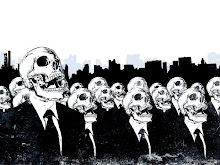



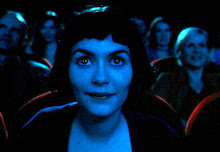

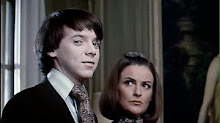



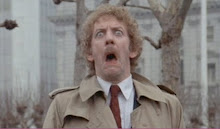
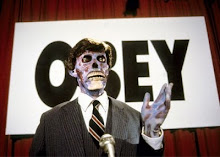


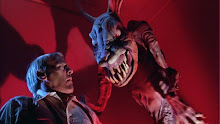
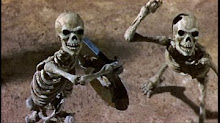
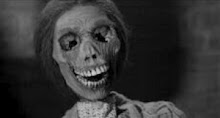
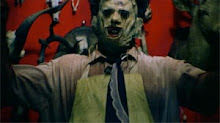
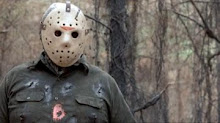
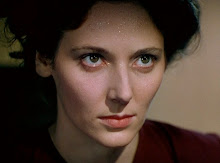


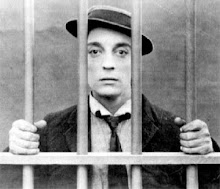
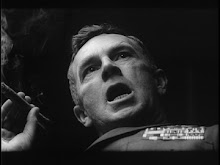
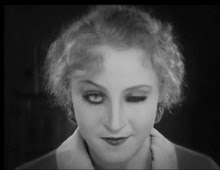
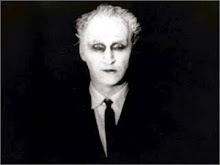
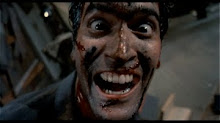
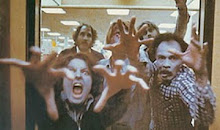
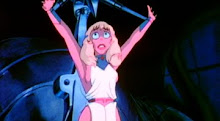
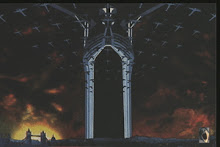
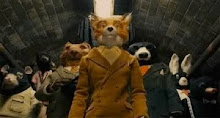
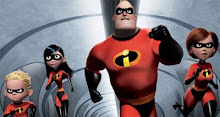
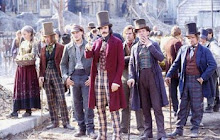

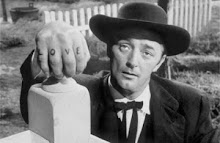
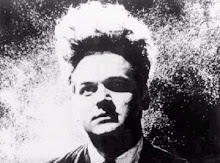
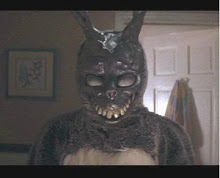

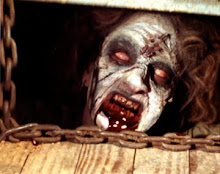
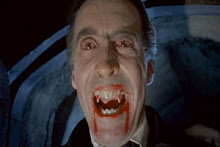

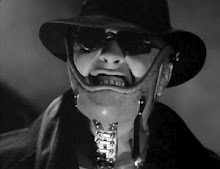
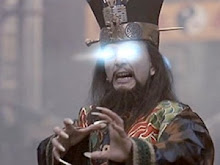


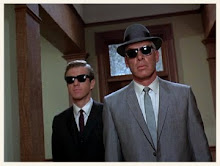
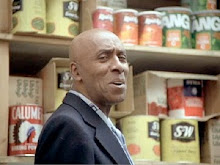

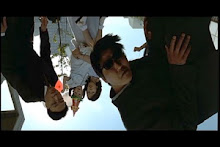


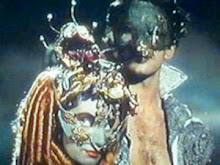
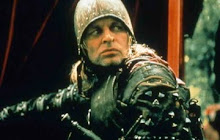
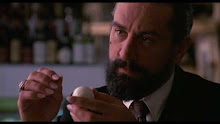
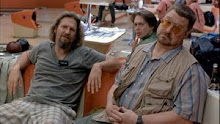
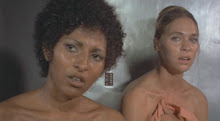

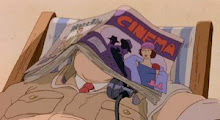
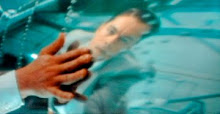
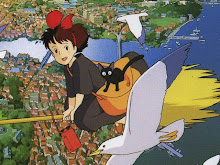
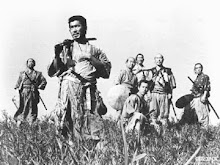
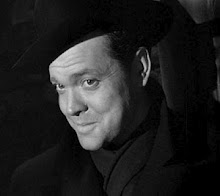
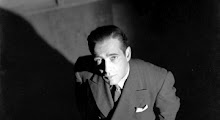

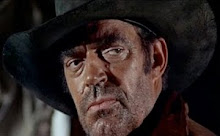
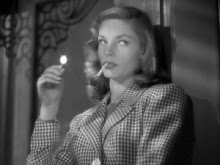
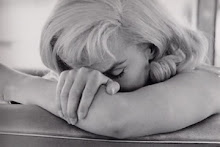
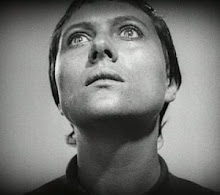

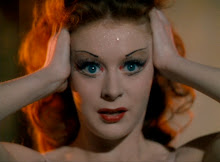

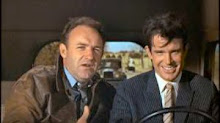

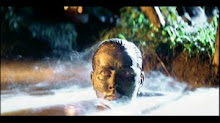


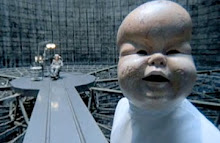
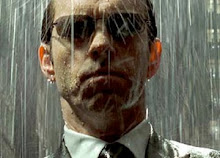
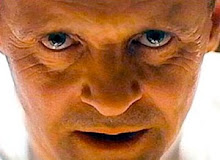




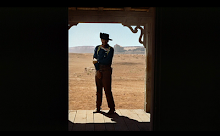


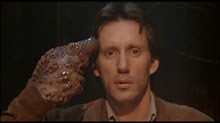

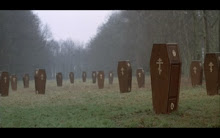




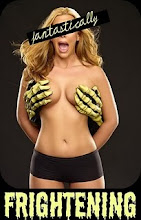
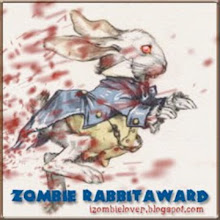

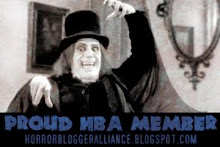
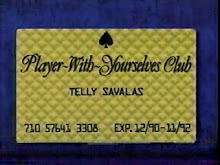
2 comments:
When I first saw Ledger's take on the Joker, I couldn't help but think of Hannibal Lecter in Silence of the Lambs -- especially in the sequence from his arrest to his escape.
Like in Lambs, the most gripping scene in TDK is two people sitting in a jail cell talking. Two diametrically opposed individuals, with radically differing philosophies and personalities, parrying with one another. And the villain knows things the hero is desperately grasping for, but he's just fucking with the hero, probing and teasing and doling out just enough information to keep the hero on his hook.
Which takes us to the next scene, of the Joker's escape. The way Nolan builds this scene is utter perfection, the way the one crazy goon with the cell phone bomb in his belly starts crying about how much he hurts and won't shut up. You don't really think much of it at first, but he won't go away, and builds and builds until you realize with horror, just what role the Joker has in mind for him. And his last lines -- "The boss said he'd make the voices go away. He said he'd go inside and replace 'em with bright lights...like Christmas!" -- are just so sad. You see how profoundly damaged (and probably mentally retarded) this crook is, and how the Joker sought him out and utterly used him like a tool, with absolutely no regard for the goon's life. We've seen evil archvillains who throw henchmens' lives away like candy before, but this was the first time I've ever felt something for Anonymous Supervillain Goon #2.
Meanwhile, as the Joker goads the cop by talking about his dead friends being cowards, takes him hostage, and blows up the police station, you see how this was his plan all along to get Lau. Despite Gordon's heroics to capture the Joker, he was five steps ahead at all times, and that's what was really frightening about his character.
Which brings me back to Lambs. Hannibal Lecter's escape from his cushy new jail cell is a similarly well-constructed sequence. From the beginning of his escape, aided by just a pen clip, he knew exactly what to do. He brilliantly used misdirection to send the cops after what they thought was him -- but was actually just a dead guard -- while he was hiding under the dead guard's face in an ambulance. He knew what buttons to push to get the guards to make fatal mistakes. And the scene has some brilliant Grand Guignol touches -- Lecter spattered with blood, "conducting" while he listens to Glenn Gould, the backlit, strung up guard looking like a moth, and Lecter pulling off the other guard's face.
Lecter is as refined, cultured and polite as Joker is crass and anarchistic. But they are two sides of the same brilliant, evil, beyond sociopathic coin.
On another point, Gary Oldman is freakin' brilliant in this movie. It's the first time Commissioner Gordon has seemed like an actual character, and not a device to give Batman a mission and move the plot forward. Him ripping off the SWAT team helmet as he arrests the Joker drew genuine cheers from the crowd when I first saw TDK. And his reaction when the mayor names him commissioner -- he looks to the ground, embarrassed, before catching himself and shaking the mayor's hand -- says so much about his character. As does the way he apologizes to his wife and takes her slap when he shows up on her doorstep.
Stephen this is exactly why you need to start your own one of these.
Thanks so much. You're completely right about "Goon # 2"
Post a Comment